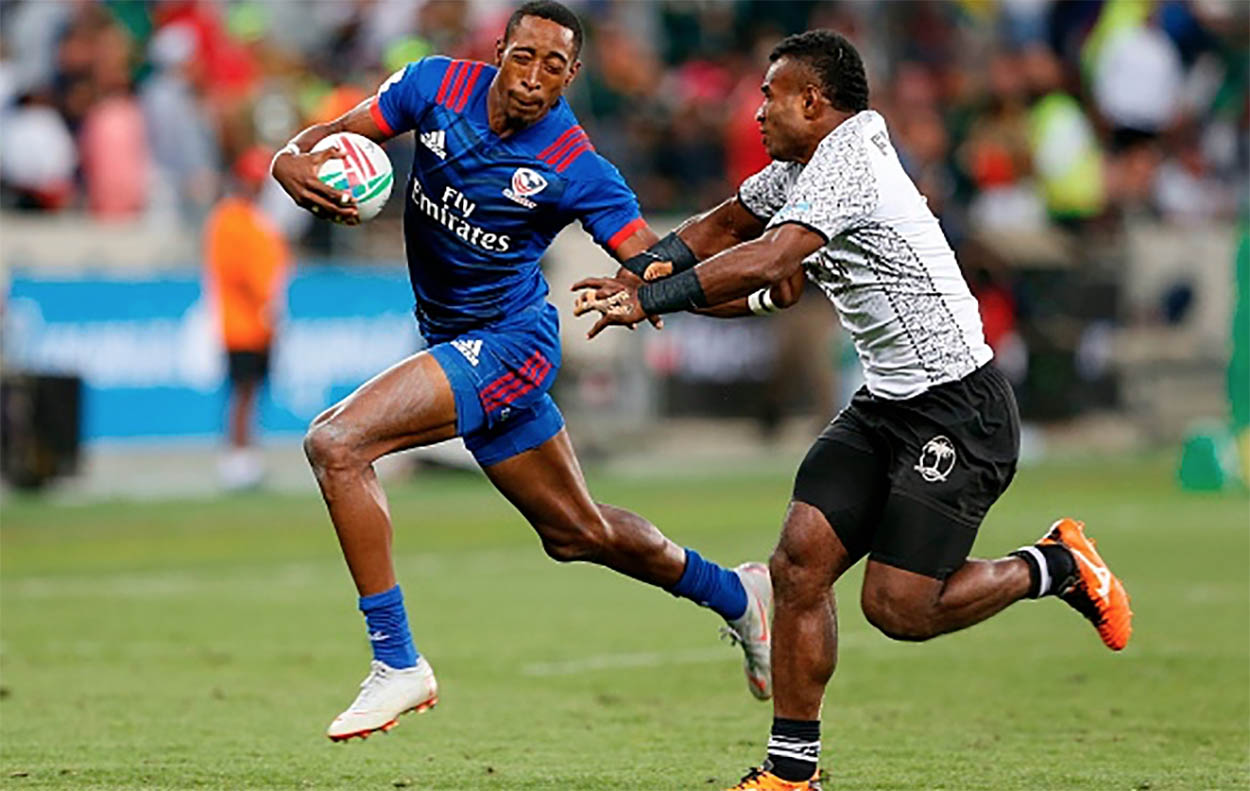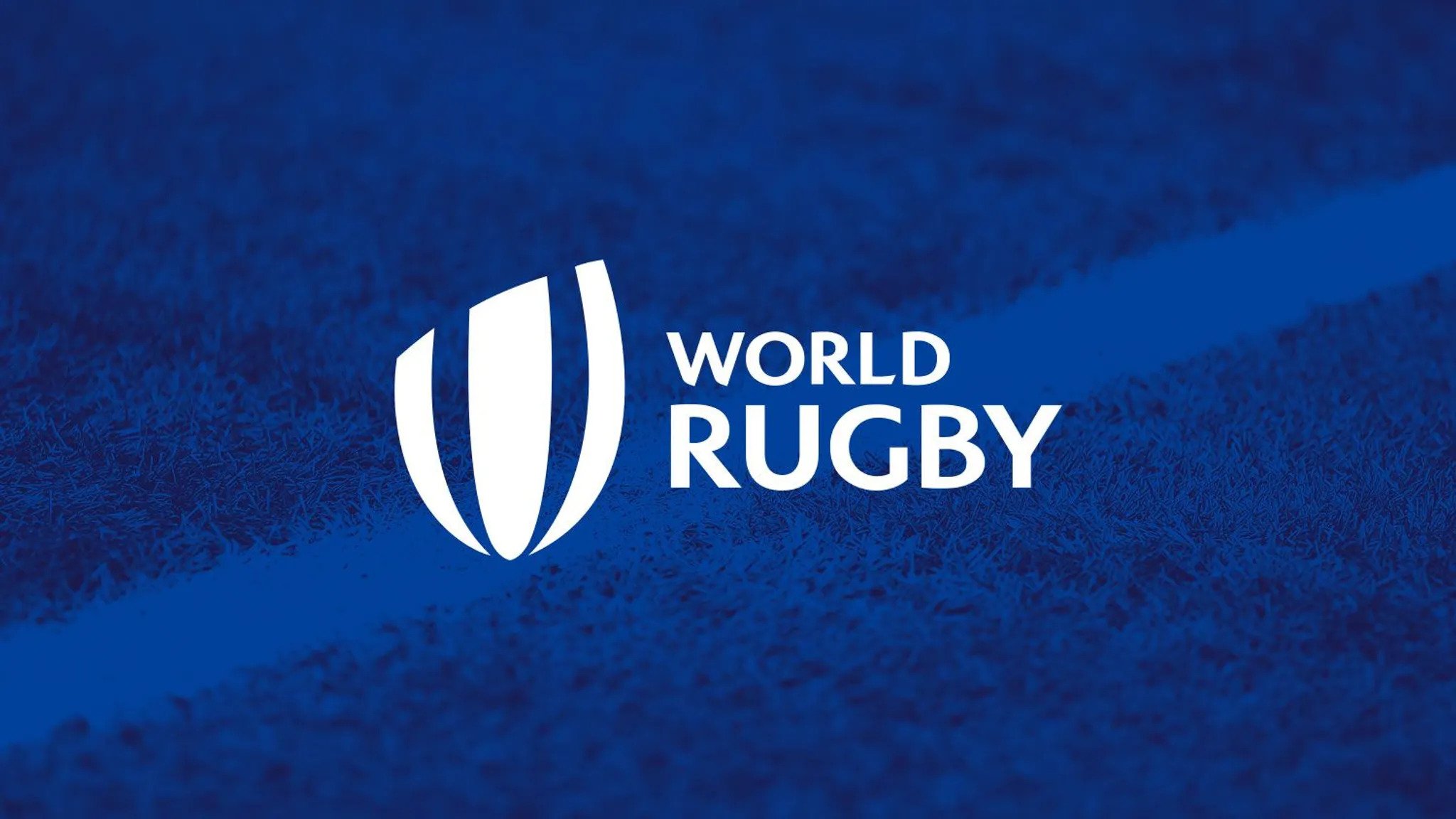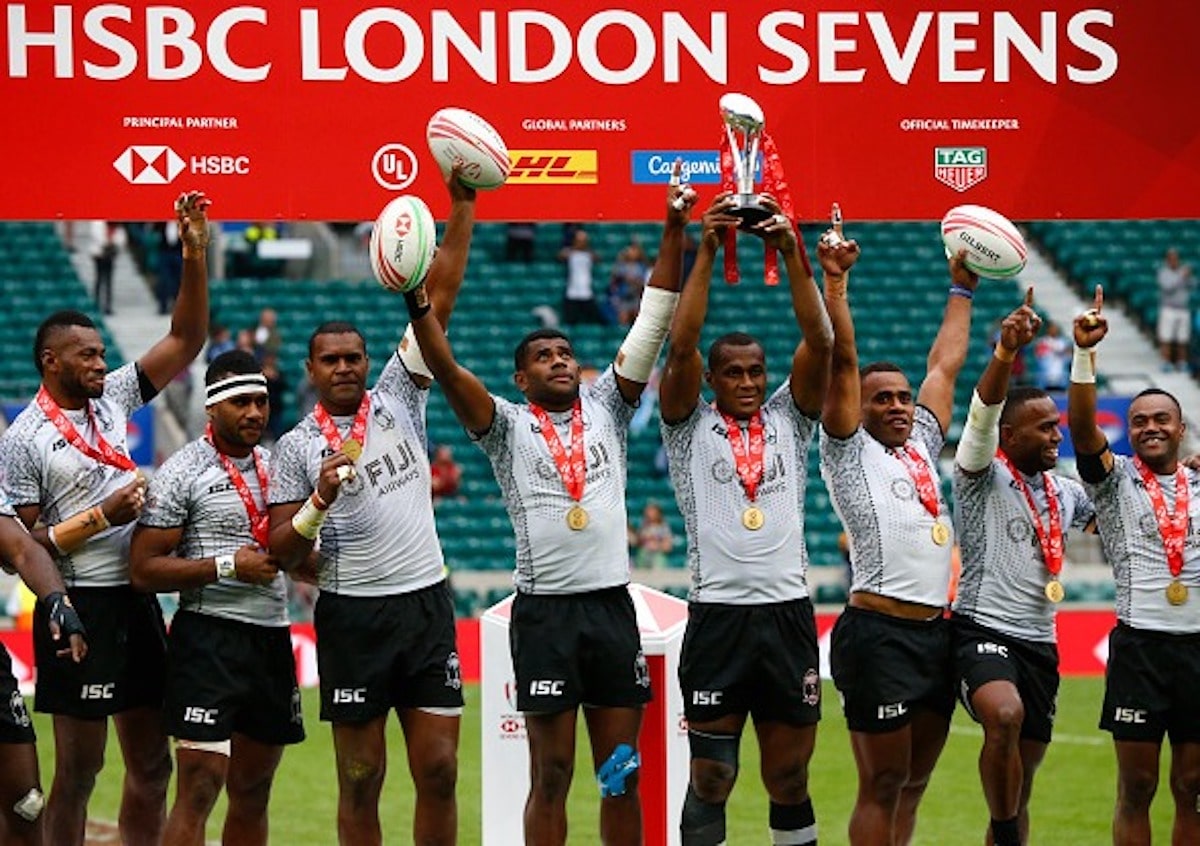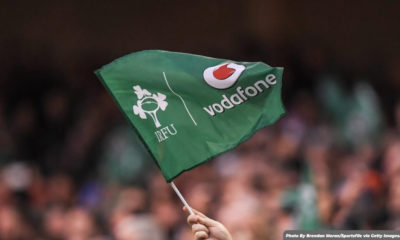Sevens
HSBC Sevens World Series returns to New Zealand
Just 5 days until the third round of the series begins in Hamilton

Photo by GIANLUIGI GUERCIA/AFP/Getty Images
On January 26th, the next round of the Sevens World Series will commence at the FMG Stadium Waikato in Hamilton, New Zealand.
It is just the second time the 23,600-capacity stadium has hosted the event, after the venue of the New Zealand round was moved from Wellington in 2018.
After the first two rounds in Dubai and Cape Town, USA top the standings; one point clear of hosts New Zealand and 3 points ahead of Fiji.
England are hanging onto the coattails of the leaders, 8 points adrift of the top.
With 16 teams contesting in 45 matches across just two days, here is a quick preview of each pool.
Pool A
Fiji will be without key men Vatemo Ravouvou and
Australia are perhaps the best equipped side to challenge Fiji for top spot in Pool A, with speedster John Porch starring yet again this series. His total of 98 points puts him at the top individual standings, 13 points clear of his nearest challenger.
Argentina, who won the Challenge Trophy in Cape Town with a resounding win over Samoa, may be the dark horses of this particular group. The South American side stunned South Africa in Dubai to reach the quarter-finals, and will be hoping to reach the Cup competition for the second time this series.
Wales
Pool B
Current series leaders USA will be the team to beat in Pool B, as ‘The Eagles’ look to secure some silverware, following two cup final losses. Head coach Mike Friday told USA Rugby; “We need to stay focused, show humility and work hard on our own game individually and collectively as we lost two finals due to mistakes which were more than avoidable”.
England will meet USA in their final pool match, in a repeat of the Cape Town quarter-final that saw the latter progress in a hard-fought 19-12 victory. Should England progress from Pool B into the Cup competition, they will be guaranteed to face a team lower than them in the current standings. With this in mind, a 4th place finish is well within reach, especially if England want to challenge for the series title this season.
Samoa and Tonga will as usual provide a physical test for the two big boys in Pool B. Samoa have twice reached the Challenge Trophy final, while Tonga return to the world stage for the next three tournaments, replacing Zimbabwe in Hamilton
Pool C
South Africa are undoubtedly the favourites for Pool C, and will be boosted by the return of the experienced Chris Dry. Dry has made over 300 appearances for the sevens side, but has missed over a year of rugby with a knee injury. The ‘Blitzboks’ will hope Dry can help them build on a third-placed finish last round.
A much-improved Scotland side have reached the semi-finals in both of the previous tournaments, and will more than likely be competing with France for the second Cup spot in the pool. France are yet to reach the Cup quarter-finals this year.
However, Kenya head coach Paul Murunga is optimistic his side can make an impact on the tournament, despite their recent troubles. A contractual row between the KRU and senior squad members has meant Murunga has been forced to rely on young, inexperienced players.
“We have already exposed five rookies in the first two legs and hopefully, we shall have more coming in to ensure there is adequate competition for places,” Murunga said.
“In Sevens it is possible to beat any team. It all depends on your level of preparedness,” he said.
Pool D
Hosts New Zealand have a number of players returning from unavailability, with Tim Mikkelson back in the squad after the birth of his first child, and Joe Ravouvou part of the ‘All Blacks’ setup for the first time since gaining New Zealand citizenship. In front of a home crowd, they will be aiming for nothing less a win, and to overhaul USA at the top of the standings.
Spain will provide New Zealand with a worthy challenge in Pool D, and the home nation will have to keep a close eye on talisman Francisco Hernandez. Hernandez has racked up 63 points so far this campaign; a notable achievement in a largely inconsistent Spanish side.
Japan and Canada make up the pool, who are two sides that still have much to prove on the world stage. The last time these two sides met in Dubai, Canada ran out 27-7 winners in an assured display.
6 Nations
World Rugby to introduce contact training restrictions

World Rugby and International Rugby Players (IRP) have published new contact training load guidance aimed at reducing injury risk and supporting short and long-term player welfare. The guidance is being supported by national players’ associations, national unions, international and domestic competitions, top coaches and clubs.
Earlier this year, World Rugby unveiled a transformational six-point plan aiming to cement rugby as the most progressive sport on player welfare. These new best-practice guidelines focus on the intensity and frequency of contact training to which professional rugby players should be exposed and have been shaped by consultation with players and coaches as well as leading medical, conditioning and scientific experts.
While the incidence of training injuries is low relative to that of matches, the volume of training performed means that a relatively high proportion (35-40 per cent) of all injuries during a season occur during training, with the majority of these being soft tissue injuries. Since the training environment is highly controllable, the guidelines have been developed to reduce injury risk and cumulative contact load to the lowest possible levels that still allow for adequate player conditioning and technical preparation.
Global study
The guidelines are based on a global study undertaken by IRP of almost 600 players participating across 18 elite men’s and women’s competitions, and a comprehensive review of the latest injury data. This reveals that training patterns vary across competitions, with an average of 21 minutes per week of full contact training and an average total contact load of 118 minutes per week. A more measured and consistent approach to training will help manage the contact load for players, especially those moving between club and national training environments. The research supports minimising contact load in training, in order that players can be prepared to perform but avoid an elevated injury risk at the same time. The guidelines aim to help strike that balance.
New ‘best practice’ training contact guidelines
World Rugby and International Rugby Players’ new framework [https://www.world.rugby/the-game/player-welfare/medical/contact-load] sets out clear and acceptable contact guidelines for training sessions, aiming to further inform coaches – and players – of best practice for reducing injury risk and optimising match preparation in season. The guidance covers the whole spectrum of contact training types, considering volume, intensity, frequency and predictability of contact, as well as the optimal structure of sessions across the typical training week, including crucial recovery and rest periods.
Recommended contact training limits for the professional game are:
- Full contact training: maximum of 15 minutes per week across a maximum of two days per week with Mondays and Fridays comprising zero full contact training to allow for recovery and preparation
- Controlled contact training: maximum of 40 minutes per week
- Live set piece training: maximum of 30 minutes set piece training per week is advised
The guidelines, which also consider reducing the overall load for players of particular age, maturity and injury profile (in line with the risk factors and load guidance published in 2019), will feature in the men’s and women’s Rugby World Cup player welfare standards.
Instrumented mouthguard research programme to inform effectiveness
World Rugby is partnering with elite teams to measure the ‘real life’ effect of these guidelines (in training and matches) and assess the mechanism, incidence and intensity of head impact events using the Prevent Biometics market-leading instrumented mouthguard technology and video analysis to monitor implementation and measure outcomes.
The technology, the same employed in the ground-breaking Otago Rugby Head Impact Detection Study, will deliver the biggest ever comparable bank of head impact data in the sport with more than 1,000 participants across the men’s and women’s elite, community and age-grade levels. The teams that have signed up so far are multiple Champions Cup winners Leinster, French powerhouse Clermont Auvergne and Benetton Treviso while discussions are ongoing with several other men’s and women’s teams across a range of competitions.
World Rugby Chief Executive Alan Gilpin said: “This important body of work reflects our ambition to advance welfare for players at all levels of the game. Designed by experts, these guidelines are based on the largest study of contact training in the sport, developed by some of the best rugby, performance and medical minds in the game. We believe that by moderating overall training load on an individualised basis, including contact in season, it is possible to enhance both injury-prevention and performance outcomes, which is good for players, coaches and fans.”
World Rugby Director of Rugby and High Performance and former Ireland coach Joe Schmidt added: “Training has increasingly played an important role in injury-prevention as well as performance. While there is a lot less full contact training than many people might imagine, it is our hope that having a central set of guidelines will further inform players and coaches of key considerations for any contact that is done during training.
“These new guidelines, developed by leading experts and supported by the game, are by necessity a work in progress and will be monitored and further researched to understand the positive impact on player welfare. We are encouraged by the response that we have received so far.
“We recognise that community level rugby can be an almost entirely different sport in terms of fitness levels, resources and how players can be expected to train, but the guidelines can be applied at many levels, especially the planning, purpose and monitoring of any contact in training.”
International Rugby Players Chief Executive Omar Hassanein said the guidelines are being welcomed by players: “From an International Rugby Players’ perspective, this project represents a significant and very relevant piece of work relating to contact load. We’ve worked closely with our member bodies in gathering approximately 600 responses from across the globe, allowing us to have sufficient data to then be assessed by industry experts. The processing of this data has led to some quite specific recommendations which are designed to protect our players from injuries relating to excessive contact load. We will continue to work with World Rugby as we monitor the progress of these recommendations and undertake further research in this area.”
Leinster coach Stuart Lancaster, who was involved in reviewing the study and advising the development of the guidelines, said: “We have a responsibility to make the game as safe as possible for all our players. For coaches, optimising training plays a significant role in achieving that objective. It is important that we do not overdo contact load across the week in order that players are fresh, injury-free and ready for match days. These guidelines provide a practical and impactful approach to this central area of player preparation and management.”
Ireland international and IRP Head of Strategic Projects and Research Sene Naoupu said: “While this is the first step of the implementation and monitoring process, it is an incredible outcome that shows just how much players care about this area. It also provides a foundation to review and determine future direction of implementation across the game, within an evidence-based injury-prevention programme for performance and welfare.”
World Rugby is also progressing a wide-ranging study of the impact of replacements on injury risk in the sport with the University of Bath in England, a ground-breaking study into the frequency and nature of head impacts in community rugby in partnership with the Otago Rugby Union, University of Otago and New Zealand Rugby, and further research specific to the professional women’s game. All of these priority activities will inform the decisions the sport makes to advance welfare for players at all levels and stages.
International
World Rugby confirm Rugby World Cup Sevens 2022 in South Africa

World Rugby have confirmed that the 2022 Rugby World Cup Sevens will be held in South Africa.
The event will take place from 9-11 September and will mark the first time that it will be held in Africa.
The top eight men’s teams and top four women’s teams from the 2018 edition in San
Francisco has already secured automatic qualification for the tournament
in 2022.
Whilst this means the women’s team gain automatic qualification after their third-place finish, the men will have to go through regional tournaments to secure their place, with 16 places up for grabs.
World Rugby Chairman Sir Bill Beaumont said: “We are delighted to announce the tournament dates for Rugby World Cup Sevens 2022 alongside the unveiling of a striking new brand that truly captures the unique, fun and carnival spirit of the tournament.
“This is an exciting time for rugby sevens with less than 70 days to go until the upcoming Olympic Games in Tokyo and now with Rugby World Cup Sevens 2022 also on the horizon.
“South Africa has a rich history in hosting world-class international rugby sevens events, and we anticipate that Rugby World Cup Sevens 2022 will once again raise the bar for this unique tournament and be like no other.”
Regional qualification is expected to start in August of this year with further details to be announced at a later stage.
World Rugby Chief Marketing Officer Marissa Pace added: “Our goal is to ignite Rugby World Cup Sevens 2022 with a bold event mark, reflecting the fast pace and dynamic play of Sevens, but also the vibrancy of Cape Town and South Africa.
“With Table Mountain at the heart of the new logo, our team has also included elements within to represent both the event year and the iconic Cape Town Stadium.
“We look forward to watching the brand come to life via our partners and hosts South Africa Rugby.”
International
World Rugby Cancels Several Tournaments
World Rugby have announced the cancelation of a number of tournaments due to the coronavirus outbreak

World Rugby have confirmed that several tournaments have been pushed back or cancelled due to the outbreak of coronavirus across the world.
Among the changes are Sevens tournaments, U20 World Cup campaigns and qualifying events for certain competitions.
The worldwide rugby body released a statement earlier today outlining their plans for the foreseeable future.
“After detailed and constructive dialogue with the respective host and participating unions, and with the wellbeing of the global rugby family at heart, the following events have been postponed:
- The men’s HSBC World Rugby Sevens Series tournaments in London and Paris will be postponed, provisionally until September;
- The women’s HSBC World Rugby Sevens Series tournament in Langford has been postponed until later in the year;
- The final men’s HSBC World Rugby Sevens Challenger Series event has been postponed until later in the year;
- Some Rugby World Cup 2021 and 2023 regional qualifying events have been postponed;
In addition, the following event has been cancelled: The World Rugby U20 Championship 2020, scheduled to be hosted in northern Italy in late June and July, has been cancelled following detailed consultation with the Federazione Italiana Rugby. The Olympic Games Repechage qualification tournament scheduled for June is under review and World Rugby continues to be in close consultation with the International Olympic Committee (IOC) regarding the implications for the qualification process in the event that the repechage is unable to be hosted due to the covid-19 outbreak. The World Rugby Hall of Fame, located in Rugby, will be closed until the end of May in line with public health authority directives,” the statement read.
The pandemic is causing havoc among the rugby community with both the Irish and English Rugby Football Unions calling a close on their domestic competitions for this season bar the PRO14 and English Premiership, which remain under review.
Elsewhere, the Six Nations was unable to be concluded in its normal time frame due to the postponement of fixtures, with further disruption expected among the international game.
In other league news the French Top 14 has been suspended and Super Rugby has done the same, however, the Australian sides are set to play against one another over the coming weeks.
The dates resumption of the current campaigns remain unknown with the pandemic stopping everything in and out of sport.













